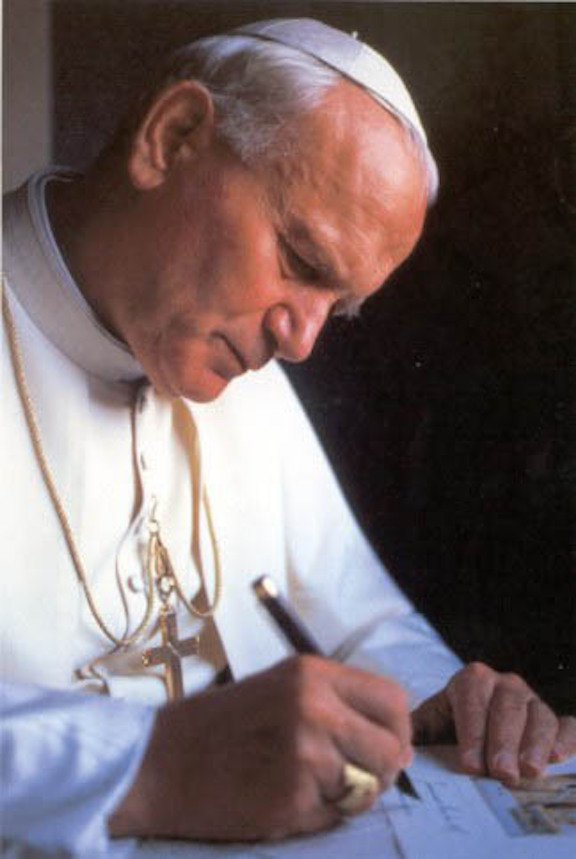Later this week, we will be celebrating the anniversary (14 September) of the issuing of Fides et ratio (“Faith and Reason”) by St. John Paul II. That encyclical is a concise but comprehensive explanation of the close interrelationship between authentic faith and authentic reason. It’s a good moment to look back and see how this contribution to the Church by a modern saint has been used since it first appeared.
At the time, it seemed odd (to unbelievers and even some believers) that the Roman Catholic Church was the institution in the modern world teaching about and advocating for reason, properly conceived.
It was, to be sure, not the universities. In a way, this was not surprising because, with a few exceptions – very few – most universities today are determined to use, at most, agnostic and rationalist methods of reasoning in all departments. At worst, universities no longer have much of a commitment to reason’s ability to reach the truth at all. The whole modern complex of accreditation and peer review is trapped in this reductive framework.
This is essentially true of almost all “Catholic” universities as well. Their academic departments – including Scripture and theology – still struggle along in agnostic, rationalist forms of reasoning.
What Fides et ratio did, and did spledidly, was remind people, including Catholics, that Catholicism knows the true context of things because proper reasoning is more than “natural.” It ultimately involves divine wisdom. This is not a matter of ecclesial chauvinism, but an affirmation that the Church affirms not only the simpler and more practical uses of the intellect, but is the custodian of the truths given to us by divine revelation.
The Church “brings to mankind light kindled from the Gospel and puts at its disposal those saving resources which the Church herself, under the guidance of the Holy Spirit, receives from her Founder.” That notion appears in the Second Vatican Council’s Pastoral Constitution Gaudium et Spes, but few are the enthusiasts of the Council who have take it to heart.
The question thus arises: why academics would be at a Catholic university if they do not believe that Catholicism has something superlative – and necessary – to offer in the academic realm. That dead-end approach seems to result from embracing the imagined romance of “diversity” or from a false sense of what constitutes professional work.

Fides et ratio. showed people what proper faith and what proper reason are. And yet there was not much of an effort to make sure that they are applied even in the Catholic Church. The attitude was “ho-hum another text from John Paul II,” or “we don’t have a clue what it means,” or most often, “we like the status quo because Catholicism isn’t the whole truth.”
Wishy-washy adherence to Catholicism has a certain comfort to it for many people. Being wishy-washy is easy and it is politically correct. It doesn’t rock the boat with our colleagues in non-Catholic institutions. As long as everyone thinks equally badly there’s no conflict.
Fides et ratio also showed up the inadequacies of many of our bishops. They are supposed to ensure that teaching is going on and that it is of the best quality possible. But they themselves would have first to understand what the encyclical says, and that is already asking a lot. Requiring bishops to have doctorates is not a solution. It certainly does not work in Germany. People can have doctorates in wrong-headed thinking too.
The real problem for the episcopate is that bishops often do not recognize the full scope of their obligations to the truth. After the nadir in catechetics right after Vatican II, the Church, under John Paul II, made a surprising recovery and developed a solid Catechism. (1992)
Unfortunately, this did not translate into a revision of the Church’s work in the remaining realms of knowledge. Bishops who have Catholic universities in their dioceses should really hang their heads.
Even Fides et ratio did not wake them up. It was mostly business as usual, leave the universities unchallenged and assert – by omission – that Catholic thinking really does not measure up to the glorious fruits of the Enlightenment.
If Catholicism is not true enough for you to implement, then whatever your position, please resign. Get another job, one that does not involve truth.
The bishops are not the only ones, however, who should be embarrassed. Diocesan clergy and religious all received the same encyclical. The deep problem is that reasoning poorly, for example, ignoring the data of faith, impairs you from operating as a fully human person.
In John Paul II’s words: with faith and reason in concert, “men and women have at their disposal an array of resources for generating greater knowledge of truth so that their lives may be ever more human.”
Ignoring Fides et ratio has meant that most people in the Church have not been pushed to develop their full humanity. Preaching does not strive to present the best combinations of faith and reason. Instead preaching keeps on getting pre-occupied with homespun thoughts or simplistic nostrums from psychology or sociology.
Congregations were not helped to contribute more to the mission of the Church, which “makes the believing community a partner in humanity’s shared struggle to arrive at truth.” (JP II) Did we do more of that after Fides came on the scene?
It’s time to re-read that astounding document and embrace the power of the truth it proclaims.
Happy birthday Fides et ratio and God bless St. John Paul II!














